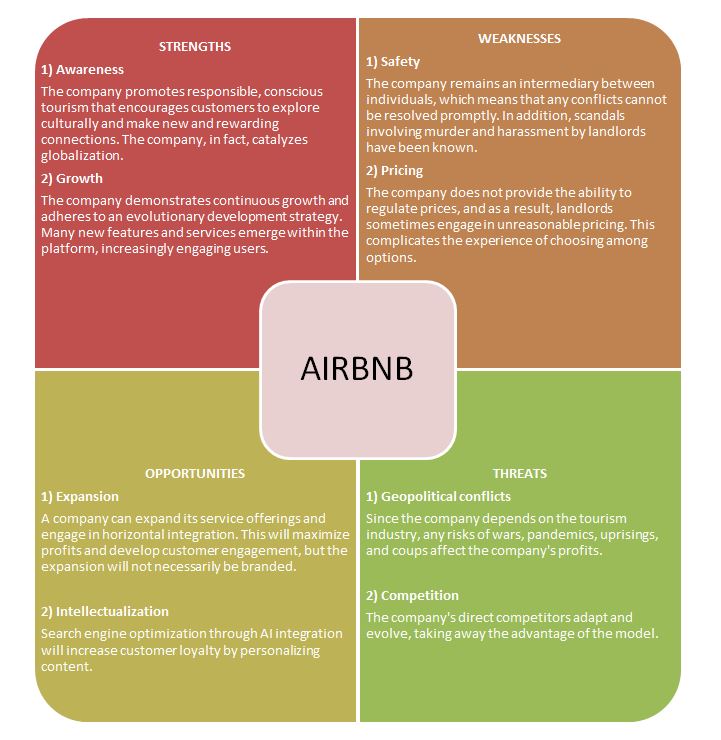Introduction
In the short-term travel real estate market, there are a number of internationally renowned platforms that allow us to book hotels, apartments, and homes for tourists around the world. Among such companies, Airbnb (Airbnb, Inc.), which entered the market in 2007, when digital technology was significantly expanding its availability, should be highlighted. Airbnb offers customers not just to rent a hotel — there are Booking or Agoda for that — but to get an authentic experience of the country through staying with local residents. This approach has strongly attracted tourists because this service effectively and competently combines booking, research, and dating.
The company is headquartered in San Francisco, and the CEO is Mr. Brian Chesky. In general, Airbnb is built on the principle of a joint-stock company, so the critical decisions of the company are taken by the board of directors (NasdaqGS, 2022). By the current moment, the value of one share of the company is $174.9, while the analysis of historical data shows a strong dynamic. Independent agencies estimate the company’s capitalization for 2022 at $111.12B (CMC, 2022). In other words, Airbnb is a thriving, dynamic business company with customer appeal.
SWOT analysis

Strengths
According to the classic model of SWOT analysis, any company has strong points, which qualitatively distinguish it from its competitors. For Airbnb, two variables were chosen that are appropriate to consider as part of the strengths. The first is the creation of an image of a platform for informed and sustainable vacations. Tourists during their travels are not only looking for opportunities to take a break from their work at the beach but also to enrich their cultural baggage of knowledge. In this sense, Airbnb is a model of awareness, as only confident, committed travelers choose the platform to book accommodations. Staying with locals or renting their apartments requires more responsibility on the part of all parties involved, so Airbnb, unlike direct competitors, is the standard of conscious tourism. On the other hand, the company provides economic stimulation by supporting small businesses. Instead of foreign tourists carrying money to the big chain hotels, they support locals and stimulate the development of the regional economy.

Second, Airbnb meets the concepts of innovation and continuous development, as is evident from a personal history of familiarity with the brand. In the beginning, Airbnb only offered users the opportunity to rent, but by now, the number of services has grown significantly. This applies not only to long-term rental opportunities — that is, in fact, Airbnb acts as a kind of real estate agency — but also to services for the experience of the service (Fig. 2). The latter includes collected tips and guides to places to visit in each country and organizing tours. In other words, Airbnb’s strength lies in supporting continuous growth and evolutionary development, which meets customers’ expectations of a modern company.
Weaknesses
A SWOT analysis, on the other hand, involves treating weak points where the company is losing out to the competition. For Airbnb, the main such issue is security since the company acts as an intermediary. The idea of the platform is a direct interaction between individuals (host and tourists), so if there are conflicts or problems, Airbnb will not be able to solve them quickly, as it may be possible in the case of the interaction between the hotel company and tourists. Thus, any difficulties in the relationship between the parties to the contract break the effectiveness of the Airbnb model and complicate its perception. For example, the scandalous fact that management “secretly pays out millions to hide murders and sexual attacks at rentals” became widely known in 2021 (Taylor, 2021). This information is destructive to the image of the company and reduces customer loyalty.
The second problem is pricing, which is not always reasonable. Hotels tend to have a transparent pricing system for rooms based on their comfort, services, and season of the year. In the case of Airbnb, however, hosts are free to set whatever price seems acceptable to them for a particular accommodation. For example, Figure 3 shows that prices for apartments on Airbnb are different, with the expensive segment being able to choose accommodations that are objectively worse than options from the cheaper segment. As a consequence, users have to explore a large number of options and tend to make complex unstructured choices.
.

Opportunities
The SWOT analysis involves exploring opportunities that are relevant to the company in the current market for further commercial growth. One of the first opportunities for Airbnb is to stimulate further growth and expand the range of services the company provides to the client. In addition to the already noted trend of being committed to continued growth, Airbnb can meaningfully expand its offerings through the sale of airline and local transportation tickets, car rentals, and current news about the country, which is especially useful in light of COVID-19, which changed the epidemiological requirements of tourism (Yeh, 2021). In fact, Airbnb does not have to implement all the changes on its platform but can create or buy out subsidiary projects and develop as a horizontally integrated company. This will significantly increase profits and customer engagement.
On the other hand, there is an opportunity for Airbnb to improve intelligent search capabilities on the site. As it was found that the company has a weakness in the organization of choices between options, an intelligent search based on user preferences, history of their interaction with the portal, and experience will create a personalized output. For Airbnb, this would be a sign of the company’s innovation and modernity in the eyes of its customers and would also significantly increase their loyalty.
Threats
However, given the dynamic international agenda, the work of Airbnb is associated with risks. First of all, it is not impossible that in the future, the world will not face more serious pandemics, due to which domestic and foreign tourism will be suspended. In addition, any military actions, civil uprisings, and coups d’état affect the availability of tourism and, therefore, can dramatically reduce the profits of the company. For example, if the U.S. closes its borders to the rest of the world, Airbnb will lose the foreign market for tourists who wanted to visit that country. Second, direct competitors see Airbnb’s advantageous model and adjust their own business plans to maximize profits. In particular, competitors such as Booking, Skyscanner, or Agoda have recently begun offering users rentals from individuals, not just hotels (Booking, 2018). Such adaptations by competitors are causing the distance between Airbnb and other aggregators to shrink, which could result in Airbnb’s advantage being eroded.
Plan for Implementing Change
The international travel market is dynamic and little predictable, and any unexpected threats, such as COVID-19, seriously affect the company’s operational efficiency. Airbnb must be prepared for any changes in the external agenda and adapt quickly in order to maintain customer engagement and maximize profits, that is, to outperform competitors. In this sense, it is advisable for the company to maintain the status quo, that is, to respond to change in a way that remains relatively sustainable (Tardieu et al., 2020). Those of the companies that fail to ensure such adaptation are unsustainable and eventually undergo a crisis. The discussion of the four quadrants of the SWOT matrix in the previous section was necessary in order to profile Airbnb to develop a plan to implement change.
In order for any transformation to be not only successfully implemented but also positively received by employees, it must be informed and justified. Thus, the first step in the plan is to fully understand the need to move forward and adapt to change coming from the leadership team. It is critical for them to be able to find the answer to why it makes sense to manage change at all. Once this is accomplished, management needs to initiate the development of specific proposals for change. It has been shown that Airbnb is open to transformation, so a lot of suggestions and ideas for corporate growth are expected in this step. Any developments are vetted before being implemented, so bringing in a third-party audit and mathematical prediction of options makes sense for a plan to implement change at this stage. Hence, if problems, weaknesses, and potential threats are identified, the implementation phases should be delayed and current models revised to make implementation painless or close to it for the company. Changes are implemented and continually evaluated in order to critically analyze their viability and, more importantly, their effectiveness within the company. If any problems are detected, Airbnb management must promptly take responsibility for their resolution and apologize to users if such problems have affected them. For example, if the Airbnb website was not functional for several hours due to technical reasons, it may have negatively impacted travelers, which has the potential to degrade their experience with the company.
It should be understood that change management is a multifaceted process that requires the involvement of people, tools, and processes. Airbnb executives are the leading executive figures who, as a whole, not only conceive of implementing the transformation in the company but also further support it. Consequently, effective communication and employee motivation to encourage change must be implemented to ensure Airbnb’s transformation goes as smoothly as possible. Operational management is achieved through processes, but any changes must be coordinated with management and planned. It is unacceptable for a manager to implement personal initiatives in the workplace that would conflict with Airbnb’s philosophy. Finally, tools are used not only as vehicles for change but also as a means to monitor change on an ongoing basis. Auditing tools and KPIs are used to assess change processes and implement adjustments in a timely manner.
The SWOT analysis has outlined some of the opportunities Airbnb can pursue in the short term to improve operational efficiency. However, implementing such changes — whether to expand services or intellectualize search — can be fraught with difficulties and conflicts. Among examples, only some of the company’s key people may be in agreement that Airbnb should implement an airline ticket search function since it is clear that in a highly competitive environment, this decision is associated with many risks. In addition, only a fraction of the company’s employees may agree that change is needed at all because there is a stability effect from which employees do not want to leave (Baker, 2020). As a consequence, Airbnb has an increasing need to manage potential conflicts when implementing change. This can be accomplished through training and creating a culture of commitment to innovation, changing conservative leadership, and modeling company dynamics without and with change. Furthermore, it is possible to establish a system of compensation and rewards for those employees who demonstrate commitment to change (Tuikka, 2019; Brett, 2018). Such practices are expected to minimize the number of barriers to Airbnb development.
References
Baker, M. (2020). How to reduce the risk of employee change fatigue. Gartner. Web.
Brett, J. (2018). Intercultural challenges in managing workplace conflict — A call for research. Cross Cultural & Strategic Management.
Booking. (2018). How does Booking.com work for property owners? Partner Hub. Web.
CMC. (2022) Market capitalization of Airbnb (ABNB). Companies Market Cap. Web.
Homepage. (2022). Airbnb. Web.
NasdaqGS. (2022). Airbnb, Inc. Yahoo Finance. Web.
Tardieu, H., Daly, D., Esteban-Lauzán, J., Hall, J., & Miller, G. (2020). Business Trends — the changing nature of business offerings and ecosystems. In H. Tardieu, D. Daly, J. Esteban-Lauzán, J. Hall, & G. Miller (Eds.), Deliberately digital (pp. 9-17). Springer.
Taylor, J. (2021). Airbnb ‘secretly pays out millions to hide murders and sex attacks at rentals’. Metro. Web.
Tuikka, S. (2019). Negative relationships in the workplace [PDF document]. Web.
Yeh, S. S. (2021). Tourism recovery strategy against COVID-19 pandemic. Tourism Recreation Research, 46(2), 188-194. Web.